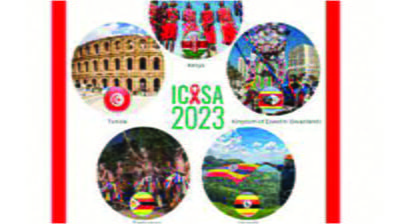ZIMBABWE is expected to host more than 8000 delegates at the International Conference on Aids and Sexually Transmitted Infections (Icasa) which will be held in Harare next month where health financing is anticipated to take centre-stage, among other issues in the fight against HIV and other infectious diseases.
The mainstreaming of health financing comes amid concerns that a number of African States have been failing to meet the 2001 Abuja Declaration where at least 15 percent of their annual national budgets have to be dedicated to the health sector in an effort to improve healthcare systems. Only South Africa has met the Abuja Declaration target.
Icasa 2023 president and president of the Society for Aids in Africa Dr David Parirenyatwa said the country was ready to host the conference which will be preceded by two high-level meetings in Victoria Falls.
The meetings will be looking at the elimination of mother to child transmission while the other will be with Ministers of Finance where discussions will centre on how finances can be raised to enable the effective fight against HIV, malaria and other infectious diseases.
“Zimbabwe is ready to receive the anticipated 8 000 participants who will be coming to attend the Icasa meeting in Harare.
We are very clear that the fight against HIV and Aids must continue because as our theme says, ‘Aids is not yet over’ and we need to continue putting efforts to fight HIV and Aids,” said Dr Parirenyatwa.
He warned against complacency saying there was need for continued collective approach so that the gains made so far were not lost.
“There has been apparent complacency in the fight against HIV, people are now saying we have done enough but there are still infections happening especially among the youths, therefore we must continue to look at the key areas to fight HIV and Aids,” he added.
He encouraged organisations that were assisting in the fight against HIV to attend the conference, adding that STIs must not be ignored.
“I am impressed with the developments. This particular conference is based on science and that is going to be key, we have many abstracts that have come up, and we have over 1500.
Most importantly we have a huge community that will attend the conference where people from all walks of life will be there to articulate their worries and concerns about the fight against HIV. The community should always be key because they are the recipients and the people we need to take care of.
“The issue of syphilis, human papillomavirus (HPV), and Hepatitis B should not be ignored. We are not just going to concentrate on HIV, Aids, TB or Malaria even any other infectious disease without talking about those other three and indeed the sexually transmitted disease syphilis that is now coming up again,” said Dr Parirenyatwa.
Minister of Health and Child Care and Vice-President of Icasa 2023 Dr Douglas Mombeshora said logistics were in place for the event.
“We have made sure that we have an efficient transportation system, both air and road. We have a steady inflow of airlines which are adequate to cover our visitors.
We have mobilised ground transport services and have an agreed standard fare. As such all designated pick-up and drop-off points for this will be marked. I want to encourage those that need visas to come to Zimbabwe to ensure that they start the process early,” he said.
Dr Mombeshora said they have put aside packages for delegates to the conference and they have been advised to use the Icasa website platforms to secure accommodation.
He also spoke of the World Aids Day which will be held on 1 December at Chinotimba Stadium in Victoria Falls saying the theme – “Let communities lead” was a call for everyone’s participation.
The World Health Organisation (WHO) said it was in solidarity with Zimbabwe as it hosts Icasa 2023 with Mr Thomas Joseph Head of antimicrobial resistance (AMR) Stewardship and Awareness at WHO saying people with HIV are more likely to develop infections like TB, fungal meningitis, and other severe bacterial infections.
“This is complicated by the threat of antimicrobial resistance, which makes those infections difficult to or sometimes even impossible to treat.
AMR is a problem that is driven by the misuse and overuse of AMR medicines including antibiotics, antivirals and results in critical medicines losing their effectiveness to treat infections and this is a very significant threat,” he said.
He said HIV drug resistance was a problem with estimates of 10 percent of adults having resistance to some of the routinely used first line treatment in HIV.
“ART has saved tens of millions of lives globally but drug resistance is jeopardising the efficacy of these medicines and resulting in an increasing number of treatment failures. Drug resistance in HIV is primarily driven by misuse and poor adherence to treatment.
AMR in general is associated with five million deaths a year. There is a huge burden of morbidity and healthcare expenditure that can affect household welfare severely. The World Bank estimates that global Gross Domestic Product could fall by US$1 to 3,4 trillion a year after 2030 due to AMR,” he added.
He said while new HIV treatment drugs may reach the market, low and middle-income countries do not readily access the drugs owing to intellectual property rights and costs. He further said countries must push for universal health coverage to ensure access to health care for all as a matter of urgency. — @NyembeziMu
Source Zimsituation









